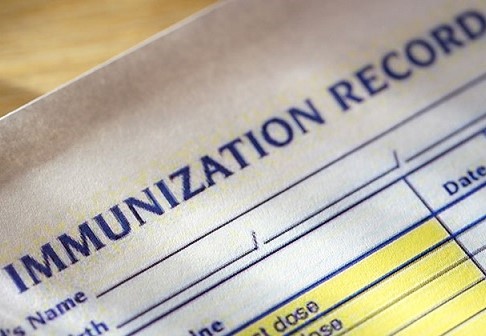BY
May 1, 2021
-Granite Grok
The New Hampshire Department of Health and Human Services has finally launched the long-contested vaccination registry to track all vaccination “events” which includes vaccination administration as well as refusals.
The intent of the vaccination registry is to create a complete repository of records to “remind registrants to receive required vaccinations,” as well as “assisting in the identification of individuals who require immediate immunization/vaccination in the event of a disease outbreak.” That’s right, they will use this system to target those who refuse vaccinations.
Information stored in the vaccination registry can be accessed by healthcare providers, schools, licensed daycare centers, health departments of Manchester and Nashua, and the Division of Public Health Services at the Department of Health and Human Services.
In addition to vaccination information, the health insurance information on each registrant, as well as the date of death, if known, shall be reported in the registry. All of this information is available for researchers approved by the Department.
According to the Division of Public Health Service’s Administrative Rules (He-P 307.06), “No patient’s immunization/vaccination information shall be entered into the registry without that patient, or the patient’s parent or guardian if the patient is a minor, being given the opportunity to opt-out of the registry.”
That means, before your doctor or pharmacist can enter your information, they have to inform you of your right to opt-out. That sounds all well and good, right? Well, there are a few issues that the public should be aware of.
First, I can tell you from experience that when the Massachusetts Immunization Information System was launched, there was a similar requirement to inform of the right to opt-out that in practice was not sufficiently satisfied. Generally, providers either posted a notice printed in 10 point font on the wall somewhere in the doctor’s office or there simply was no mention of it at all. There is no penalty for healthcare providers who fail to inform or provide the opportunity to opt-out.
Next, in order to opt-out of the vaccine registry, a patient must first find and fill out the Opt-Out form. That can be more difficult than one would think. To find it, you must go to the DHHS website, DHHS.nh.gov, then type in the search bar “NHIIS opt-out.”
NHIIS stands for New Hampshire Immunization Information System. Most people know of this system under the name “vaccination registry.” Under statute, that’s what it is called.
Giving it a new name, that many people do not know and which is not authorized by statute, can be confusing and problematic for those who are seeking information on the DHHS website. It also calls into question the validity of the administrative rules on this system, as the rules refer to an “immunization/vaccination registry,” and not an “immunization information system.”
Once they have obtained the form, the patient or parent/guardian of a minor patient must fill out and send a copy to every healthcare provider who has their vaccination records. Any current or former provider could submit the records into the registry. The healthcare provider must then sign the form and be trusted to respect your request not to enter your sensitive information into the system.
This is precisely why HB 221, a bill by Representative Tim Lang (R- Sanbornton), was so important. It would have changed the statute to require healthcare providers to obtain written consent prior to entering private health information into the vaccination registry.
As I had mentioned during the Health, Human Services, and Elderly Affairs Committee hearing on the bill, not ensuring written consent, making the registry an opt-in system, would result in many people being tricked into having their data collected by the government, without their knowledge.
Further ensuring this covert collection of private health information is the fact that DHHS launched the NHIIS for broad use without announcement. They kept it quiet.
It came to my attention only after learning that some healthcare providers had sent a notification to families informing them that they had until May 3rd to get their opt-out forms to the office or their data would be sent to the government.
According to the DHHS site cache information, the opt-out form was made available on April 14th, 2021. How many people will now have their data entered into the system as a result of not having the resources to get these forms into their providers in time? Too many.
To have personal health information withdrawn once it has been entered into the system, another form is then required, with a signature from the patient’s healthcare provider. The healthcare provider must mail it to DHHS.
It is unclear whether DHHS will be maintaining a list of those who requested to have their information withdrawn. If they do, that would be a de-facto registry of those who wish not to be tracked. Another form is available to request a record of what information the state has on you within the registry.
In 2019, over 80% voted in favor of adding Article 2b to the New Hampshire Constitution, which reads, “An individual’s right to live free from governmental intrusion in private or personal information is natural, essential, and inherent.” But the NHIIS allows the Department of Public Health to monitor the private health information of Granite Staters who overwhelmingly wish to be free from government surveillance.
I urge all Granite Staters who wish not to have their health records tracked by the government to opt-out and call on lawmakers to fix this unconstitutional system.




